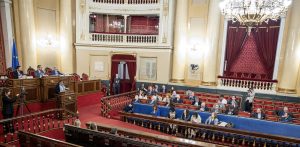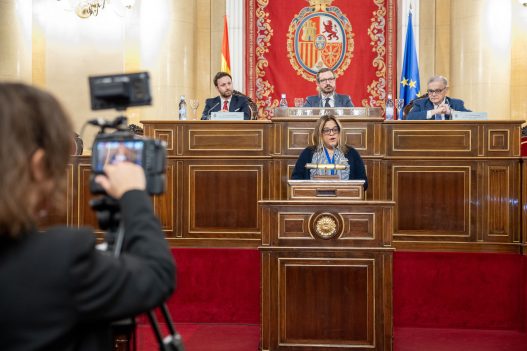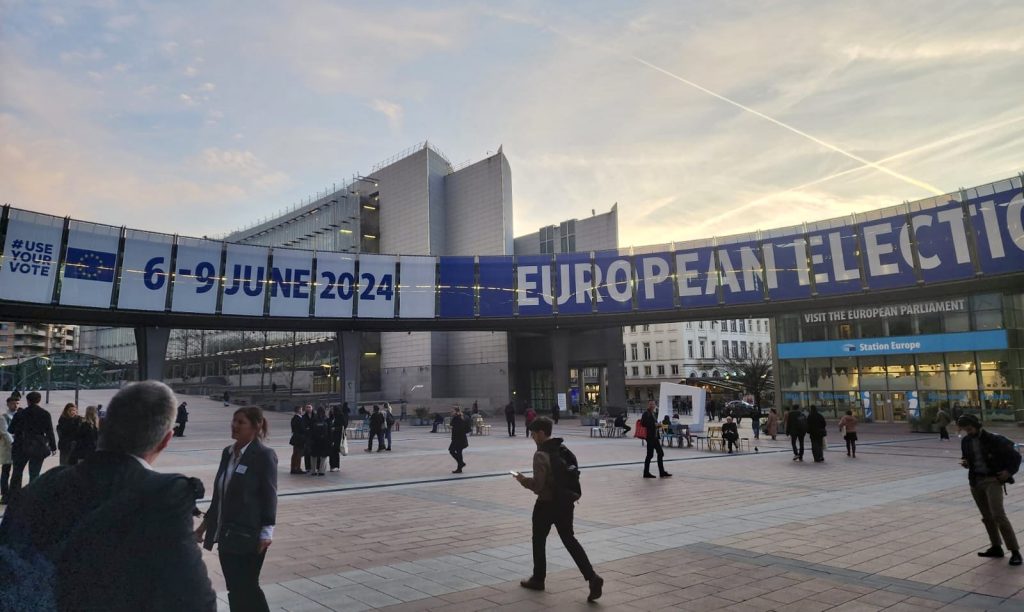
IN SIX PANELS, THE VII EDITORS' CONGRESS EXPLORED JOURNALISTIC CHALLENGES IN EUROPE AND LATIN AMERICA
The second day of the Congress of Editors of Europe and Latin America, the EditoRed Congress, was dedicated to the analysis of six topics of high interest for communicators from both continents.
The day began at the Senate building in Madrid on Tuesday, March 19, 2024. At the opening, by Rita Vásquez, director of the newspaper La Prensa of Panama, the good practice of sharing good journalistic practices to face common challenges in a globalized and polarized world was highlighted.
The morning was dedicated to the analysis of four topics. The details of what was mentioned in them will be presented in specific notes that EditoRed is preparing, which will include the videos with the complete interventions of the panelists, material that will be freely accessible.
INCLUSION
The first topic discussed was Inclusion in the media. One of the most important conclusions was that it is necessary, also for the sustainability of the media, to approach other topics that talk about issues, groups and people that have not normally been taken into account in the programming. However, it was emphasized that this inclusion of topics should not be an opportunistic approach but rather a consistent and long-term approach.
To this end, it was pointed out that it is also important for newsrooms to be more inclusive in their own conformation.
The panel included the participation of Alba Lucía Reyes, correspondent in Spain for WRadio de Colombia, and Elena Martínez García, deputy director general of Fundación Codespa. The moderator was Costa Rican journalist Iary Gómez, former editor of the newspaper Extra.
STRATEGIC DISINFORMATION
Fake news as a tool for global geopolitical disputes was analyzed in the second panel of the Congress.
Rafael Rubio, professor of Constitutional Law at the Complutense University of Madrid; Giedrius Sakalauskas, director of Res Pública – Civic Relicience Center, Lithuania, and Asela Pintado, executive director of the European Observatory for the Analysis and Prevention of Disinformation, participated in this panel. Rita Fatiguso, from the Italian media IlSole 24Ore was the moderator.
Some of the relevant theses that were presented in this panel were that care must be taken to ensure that in the name of combating disinformation, freedom of expression, the fundamental basis of democracy, does not end up being affected.
Also, it should be understood and explained that much of the disinformation that circulates, especially that related to wars, is not the product of a fault but of an intention: to provoke fear and, ultimately, to win wars without using more soldiers.
THE POLITICAL TURNS
Where are Latin America and Europe turning politically? This was the premise of the third round table discussion.
It was clear that there are some difficulties in the relations between both continents explained, to a large extent, by the lack of a valid and consensual speaker in Latin America and the Caribbean to address issues of interest with Europe, which already has a consolidated joint institutionality.
In this context, there has been little progress on the commitments made by the states at the CELAC-EU Summit, held in 2023. However, the media were encouraged to collaborate in order to change these circumstances and find more effective mechanisms for dialogue for the benefit of the societies of America and Europe.
The panel included Adrian Bonilla, executive director of the EU-LAC Foundation, and Ramon Jauregui, president of the Euroamerica Foundation. The moderator was Carlos R. Roberts, deputy general editor of La Nación, Argentina.
CITIZEN PARTICIPATION
The last panel of the morning session focused on Citizen Participation.
Speakers included Magdalena Trillo Domínguez, professor at the University of Granada and Digital Transformation advisor for Grupo Joly; Liza Gross, advisor for the Solutions Journalism Network; and Luis Ayllón, director of The Diplomat in Spain. Fernando Quijano, director of La República, Colombia, was in charge of the moderation.
Journalists and newsrooms were encouraged to find new ways of approaching audiences, many of whom have moved away from traditional newspapers.
New actors, such as “influencers” or “podcasters”, have found a language and forms that have allowed them to achieve a closer communication with audiences and that there are some elements that the media could take into account.
There was also a tour of very varied proposals of what is known as Solutions Journalism, one that requires the participation of the community in the definition of relevant problems that deserve to be addressed by the media; in addition, it focuses on the solutions that have been proposed and gives journalistic follow-up to this social process.
A BREAK AT TELEFÓNICA
Telefónica’s District C, the large complex of the Spanish communications giant, received the congress participants. They were able to learn first-hand about the technological advances and projects developed by this company, one of the sponsors of this VII Editors’ Congress.
With regard to the news media, the company showed, among others, technologies to place a hologram of the journalist on a television set, for example, even if he is far away from there. Information verification tools were also shown.
DRUG TRAFFICKING
“The current state of the drug trafficking business; international connections, political connections”, was the theme of the fifth panel of the day, which took place at the Aranjuez campus of the Rey Juan Carlos University.
There was consensus in pointing out the transnational nature of this phenomenon. In particular, the strong relationship between drug production and transport and Europe, which is one of the main consumers of this commodity, was highlighted.
In fact, an important aspect that was pointed out was that, according to the results that are visible, the approach of military and police combat against drug trafficking has not been effective. Hence the need to include in the discussion one of the key components of this criminal business: drug consumption in countries with high purchasing power, such as Europe, which generates unlimited profits for drug traffickers and on which little has been done.
This panel included the participation of Carlos Martínez de la Serna, program director of CPJ; Arturo Torres, founder and director of the research portal Código Vidrio, and Nicolás Pascual de la Parte, former Spanish Ambassador to NATO. The moderator was Carlos Mora, secretary general of EditoRed.
POLITICAL MEDDLING
The last panel dealt with the “Influence of politics on the impartiality and independence of the media”.
Fernando Chamorro, editor of the newspaper Confidencial, spoke about the challenge of developing quality journalism from exile. He, as well as other compatriot journalists of his, received several attacks from the Nicaraguan government, which led them to go into exile in Costa Rica for. Since then, they produce and publish news to tell the Nicaraguan reality.
Stanislau Ivashkevich, president of the Belarusian Investigative Center, recounted his own experience of being detained in his country because of his news reporting.
And Nathan Jaccard, editor for Latin America of the Organized Crime and Corruption Reporting Project (OCCRP), highlighted the importance of collaborative journalism in the investigation and publication of transnational corruption issues, especially, which is also a support for journalists and media that participate in the publication of highly relevant issues, as it happened with the Panama Papers.
THE CONGRESS
The VII Congress of Media Editors of the European Union, Latin America and the Caribbean is an event organized by Grupo Prestomedia with the support of EditoRed, the European Commission and the European Parliament, Telefónica, Iberia and the Community of Madrid, as well as the collaboration of Universidad Rey Juan Carlos, Turismo de Galicia and Casa de América, and with Prensamedia as editorial partner.
—-
This text is free to use. If you use it, please cite EditoRed.



